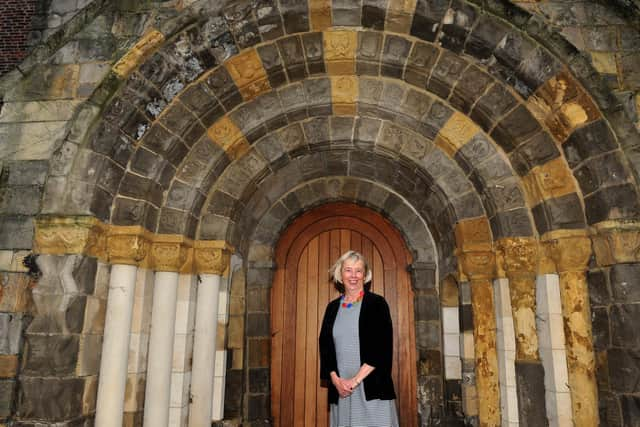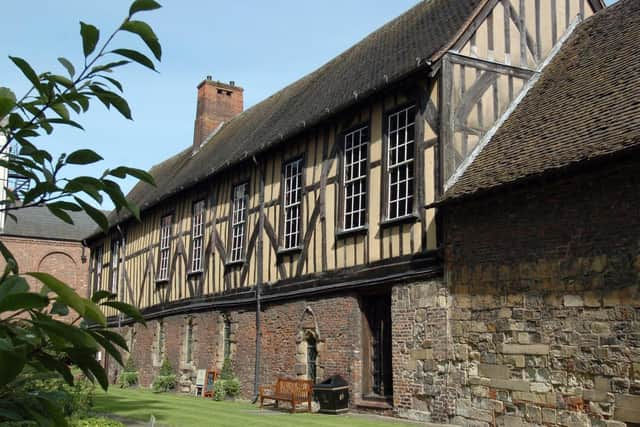The fascinating past of York's Merchant Adventurers' Hall and the first woman ever to be at its helm
Tucked away in leafy gardens off Fossgate, York’s historic, Grade I-listed Merchant Adventurers’ Hall is of national importance as one of the oldest and largest surviving trade guild halls in Britain.
The timber-framed structure looks much as it did in its medieval heyday but, behind the scenes, change is most definitely afoot; a woman is at the helm for the first time in its 665-year history.
Advertisement
Hide AdAdvertisement
Hide AdLast month, Dr Delma Tomlin MBE was inaugurated as the first female Governor of The Company of Merchant Adventurers of the City of York, which started life in 1357 as one of the city’s 47 guilds. The guilds were formal groups of citizens who come together to promote and protect their common interests, although only a handful remain today.


The like-minded individuals who built the Merchant Adventurers’ Hall originally formed a religious fraternity. However, by 1430 most of its members were mercers – traders who used their own money to venture overseas and bring goods back to York – so they set up a trading guild, using the Hall to conduct their business affairs, meet socially, look after the poor and for religious worship.
Despite its long and prestigious history of promoting enterprise and commercial ‘venturing’, the company, as it is now called, is no longer a trading association. Today, it holds the Hall in trust, operating it as a museum, as well as administering charities and playing an important role in the civic and business life of the city.
The company still uses the hall for meetings and holds services in its chapel, but it’s also a popular wedding and events venue, has a busy cafe and is open to the public on a daily basis.


Advertisement
Hide AdAdvertisement
Hide AdAlthough there are examples of women playing an active role in the company’s organisation over the centuries, Delma revealed that ’women were only invited in’ as recently as 2001 and still make up just 14 per cent of its membership.
Clearly unfazed by the idea of shattering a glass ceiling that has remained intact for more than six centuries, she jokes: “We’re a little way off 50 per cent yet,” before adding, “I may be the first woman, but I certainly won’t be the last.”
Anyone familiar with Delma’s long and successful track record of founding and leading high-profile cultural events and organisations across the city will know that she’s no stranger to challenging the status quo or breaking down barriers.
Born in Nottingham, she moved to York in the 1980s when the organisers of the famous Mystery Plays asked if she’d be interested in taking over as administrator. The city has been Delma’s home ever since and she has played a key role in developing York’s annual Early Music Festival, which will take place between July 8 and 16.
Advertisement
Hide AdAdvertisement
Hide AdShe’s the founding director and Chief Executive of the National Centre for Early Music, which is based in St Margaret’s on Walmgate, a Grade I-listed medieval church that was close to collapse before Delma spotted its potential and saved it from dereliction.
She’s also on the University of York’s Court, a body whose members are ambassadors and friends of the university and represent its interests in the wider world. “To some extent, the National Centre for Early Music and Merchant Adventurers’ Hall are similar businesses,” Delma says. “They’re both relatively small charities that are trying to punch above their weight.”
In her new role as Governor, Delma is keen to ensure that The Company of Merchant Adventurers still has ‘prominence, legacy and relevance’ in modern day York and can continue to fulfil its original objective of supporting business enterprise.
She explains: “The hall has always been about business enterprise and we’ve developed a five-year strategy, which we hope will be agreed by our Board of Trustees during the coming weeks, that sets out a path for how it will do this in the future.
Advertisement
Hide AdAdvertisement
Hide Ad“We’re next door to the River Foss and the new Castlegate development is not far way. We need to consider whether, as the river opens up, there are more opportunities for the hall, rather than us turning our back on it. There’s currently a great thrust to talk about the river and we want to enable people to do that.”
With this in mind, the Merchant Adventurers’ Hall is currently hosting an exhibition called The Two Rivers, which examines the legacy of the city’s rivers – the Ouse and the Foss. Delma explains: “Without the rivers, the Merchant Adventurers’ Hall wouldn’t exist. It’s about how the merchants used the rivers in the past for transport and made the city very rich by bringing in ginger, lemons and other goods that people wouldn’t have seen before.”
She acknowledges that the last two years have been incredibly difficult for membership organisations of all kinds, but adds: “The Hall and the National Centre for Early Music have both come out of the pandemic in amazingly good health, thanks to the Government grants that we received. However it was a tough time as there were no opportunities for people to network and enjoy one another’s company.”
Clearly excited about the prospect of leading such an important piece of York’s rich history into its next chapter, Delma continues: “The adventurers used their own money in order to be able to travel and this mercantile class brought great wealth to the city in medieval times, but then they it disappears. There was a dip, but the hall survived. After the Second World War a lot of money was spent on restoring it and it’s now in beautiful condition.
Advertisement
Hide AdAdvertisement
Hide Ad“I’m in a lucky position. Quite a bit of money has been spent on the garden and we have a successful cafe, where people can sit outside and enjoy the peaceful garden space, which is almost subterranean because it’s set below street level. In the museum, we have a rather unusual collection of items that were brought back by merchants.”
Recent short-term changes have included enhanced planting and the installation of a stone pinnacle, which was once part of York Minster, in the garden to commemorate the Queen’s Platinum Jubilee year.
Delma added: “It’s remarkable that we have this medieval hall in the condition that it’s in and it has had the same owners since the 14th century – the mercantile class or what we’d call business people today. So many of the ancient guilds of York, London and other cities have been lost, in fact the Guildhall here in York was bombed in the war and London lost a lot in the Great Fire of 1666.
“It’s utterly extraordinary that the building’s timber was used in 1357 but it was already an established tree before that – when was it planted? There are marks on the timber within the building where candles have been too close, which could have been disastrous. Victorian times were very tough for the Hall as York was in an economic slump but, thankfully, after the war, people were interested in restoring buildings.”
Advertisement
Hide AdAdvertisement
Hide AdAs she talks about the hall’s fascinating past and the company’s plans for its future, Delma’s passion and drive are palpable. Somehow, you just know that it’s in safe hands.
The Two Rivers Trail exhibition is now open and will run until Friday March 31, 2023. Through the trail and the hall’s unique collections, visitors can explore the legacy of the city’s two rivers – the Ouse and the Foss – from fortune, flood, exploration and opportunity to fashion and commerce.
The Merchant Adventurers’ Hall is open to visitors from 10am to 4.40pm from Sunday to Friday, and from 10am to 1.30pm on Saturdays. Admission is £6.50 for adults, £5.50 for concessions and free to children under 16 years.
The main entrance is from Piccadilly and has steps leading down to the gardens, but there is level access for wheelchair users from the Fossgate entrance. For more information, visit www.merchantshallyork.org/
